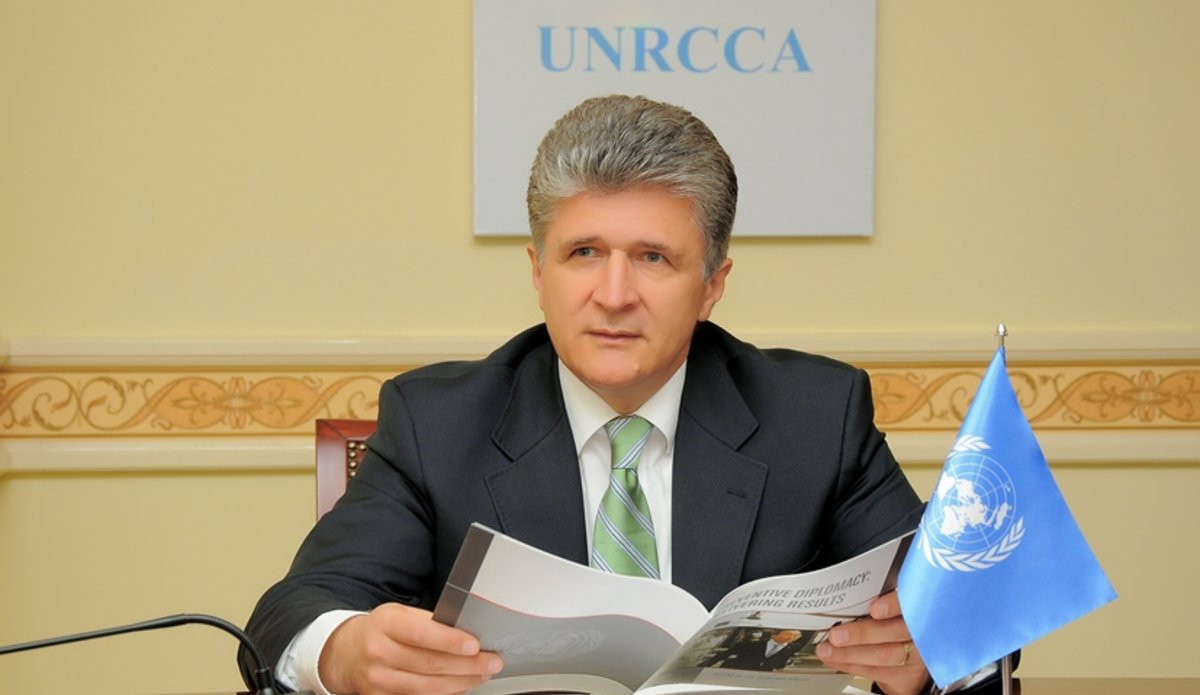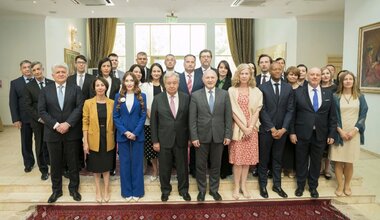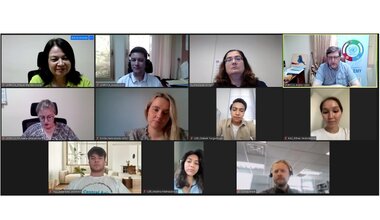Interview of SRSG Miroslav Jenča to Turkmenistan's newspaper "Neutral Turkmenistan"
ASHGABAT, Turkmenistan
Question: Dear Mr. Jenca, it is one year past since the UN Regional Center was established in December 2007, along with the congratulations on this occasion let me ask a question. There are various types and forms of diplomacy, and preventive diplomacy is one of them. Could you explain the difference between preventive diplomacy and other types of diplomacies, what the advantages are, and disadvantages if there are any?
Answer: At first time the idea of preventive diplomacy was presented on the XXV Session of the UN General Assembly by the Secretary-General Doug Hammarsheld. Later the concept of the preventive diplomacy was outlined in the well-known report of the Secretary-General Boutros Boutros Ghali "An Agenda for peace" in 1992.
Preventive diplomacy differs from the ordinary diplomacy in the generally accepted meaning of this term. Preventive diplomacy is a complex of political measures focused on identifying of conflict causing situations on the very early stage and elimination of potential threats.
Governments of states, international organizations and politicians apply a preventive diplomacy's principles nowadays. Political scientists and experts consider preventive diplomacy as a very actual tool to prevent conflicts in contemporary strings. However preventive diplomacy is not the only way to solve the current and potential problems. Political will of states is still an essential factor in applying preventive diplomacy effectively.
Q. - Mr. Jenca, can you briefly tell us how the UN Regional Center for Preventive Diplomacy for Central Asia was established, and why particularly this region attracted the attention of the world community to establish such a structure of the United Nations?
A. - The Regional Center for Preventive Diplomacy for Central Asia is a special political mission of the United Nations which was established on the initiative of five states of the region – Kazakhstan, Kyrgyzstan, Tajikistan, Turkmenistan and Uzbekistan. While initiating this proposal, the Governments of the of the region took into consideration the multiple threats that face Central Asia, including international terrorism and extremism, drug trafficking, organized crime and environmental degradation.
On May 7, 2007, the UN Secretary-General addressed to the Security Council informing on a decision to establish a Preventive Diplomacy Center for Central Asia. The official opening of the Center took place in December 2007 in Ashgabat.
The Center's role is primarily consists of facilitation dialogue for the Governments of Central Asia seeking for solutions on issues of common concern and elimination of potential threats; maintaining regular contacts with international organizations operating in the region and encouraging their peacekeeping efforts and initiatives; coordination and information exchange in joint efforts on conflict prevention; cooperation with other relevant UN Agencies operating in the area of sustainable development and conflicts prevention.
Q. - The office of the Regional Center is located in Ashgabat, I would like to know why the Turkmen capitol city, also how were you received in Turkmenistan and how the Center has been working on the primary objectives within the Mandate?
A. - The decision on establishing the office of the Preventive Diplomacy Regional Center in Ashgabat city was made upon a consensus reached by the leaders of five Central Asian states. The Government of Turkmenistan provided great conditions for the Center to operate including a wonderful office building with a capacious conference hall.
Q. - Mr. Jenca, could you please let us know what the Center has achieved during the first year since its establishment and how your organization was interacting with the Governments of the region?
A. - Within the short period of time since I arrived in Ashgabat in June 2008 I visited all states of the Central Asian region and Afghanistan. The Preventive Diplomacy Center maintained good working relationships with leaders of the states in the region, UN Agencies operating in Central Asia and Afghanistan, and with close involvement of the Central Asian Foreign Ministries developed a program of actions for 2009-2011.
A close cooperation is built with such regional organizations like Organization on Security and Cooperation in Europe, Commonwealth of Independent States, Shanghai Cooperation Organization and other entities.
A meeting of representatives of the Central Asian Foreign Ministries, regional organizations and UN Agencies operating in Central Asia took place in September 2008. I would like to emphasize the opportunity that I had by participating in a meeting of the Central Asian states' leaders discussing water and energy issues that took place in the course of the CIS Summit in October 2008 in Bishkek. I consider this as recognition of the UN role, and particularly the Regional Center, in searching for solutions of the most critical problems of the region.
Q. - Turkmenistan, as it is known, is a neutral state. Techniques and methods used in preventive diplomacy are related to the neutrality principles. Can you tell how this helps the Center to effectively cooperate with the Government of Turkmenistan?
A. - The permanent neutrality of Turkmenistan was recognized by the UN General Assembly in December 1995. I think that the neutrality of Government has an emphasis in the context of our Center's activity, as this status allows using Turkmenistan's potential as a neutral mediator in searching for solutions of existing problems and preventing conflict situations. It's not by accident that the Turkmenistan's capitol city was picked for operating of the UN Regional Center's office.
Q. - Mr. Jenca, not long ago you reported before the Security Council. Could you tell a few words about this, please?
A. - Yes, correct, on December 10, 2008, I delivered a report on activities and plans of the Regional Center to the UN Security Council. The Security Council supported the basic trends of the Regional Center's activities and hailed its cooperation with the Governments of the Central Asia and regional organizations on issues related to preventive diplomacy. In New York City I also met with the UN Secretary-General Ban Ki-Moon and other high level officials of the UN Secretariat to discuss the further steps for the Regional Center to implement its program of actions.
Q. - Mr. Jenca, let’s talk about prospective trends of the Center's activities planned for the nearest future and, if possible, for the longer term perspectives.
A. - As I mentioned, Governments of Kazakhstan, Kyrgyzstan, Tajikistan, Turkmenistan and Uzbekistan when making a proposal to establish such a Center took into account the multiple threats face Central Asia, including international terrorism and extremism, drug trafficking, organized crime and environmental challenges.
According to our program of actions which was principally supported by the Central Asian Governments we are planning to carry out a number of activities on our priority areas including the issues related to combat organized crime and drug trafficking, effective management of water and energy resources, situation in Afghanistan.
In the nearest future the Center is going to fulfill projects on water and energy nexus, assisting Central Asian states to train nationals on preventive diplomacy issues. A joint project with the national institutes for strategic research, political scientists and experts is another important activity in the plans of the Regional Center.
Q. - Recently the UN General Assembly adopted a Turkmenistan-initiated Resolution "Secure and stable transition of energy sources and its role in providing a sustainable development and international cooperation." What would you say on this occasion?
A. - The fact the Resolution "Secure and stable transition of energy sources and its role in providing a sustainable development and international cooperation" was adopted is critical. Turkmenistan which is being actively involved as a supplier to the world energy market has become the initiator of the document that is aimed to create stability for progressive development in the area of international cooperation and economic security.
Fifty seven states became co-authors of the projects of the Resolution, this witnesses of the great interest to the issue. It is also important that the Resolution includes conducting a high-level conference initiated by Turkmenistan to discuss particular steps in searching for solutions of the problems in this area.
Q. - The Regional Center on Preventive Diplomacy is a unique entity and has no analogues. Establishment of this UN entity which operates for one year in our region is an experiment itself of which the other similar centers planned to open in the future in different parts of the world depends on. If we look at the achievements does it worth to have what we can call "a Central Asian experiment"?
A. - I think it is a bit early to outline the achievements. As I told before the Regional Center in fact started its operation in June 2008. I think that only states on whose initiative this Center was established can assess how effective are the Center's activities.
I personally can tell those close relationships that were maintained between the Regional Center and the Governments of the regional states are witnessing that the future potential of our cooperation is quite high. As for the outcomes of what you called "a Central Asian experiment", I think, we can come back to this later.
The Center for Preventive Diplomacy for Central Asia is one of five regional centers that the UN Secretariat is planning to establish in future. As it is seems, the experience our Center gains will not be possible to use exactly as a universal model for other regions where such offices are going to be opened. Because every region is unique in historical and cultural identity. Therefore, taking into account peculiarities of every region, a particular approach to solve the problems will be used.
Q. - And wrapping up our talk let me congratulate your Center and its personnel with the first anniversary since its establishing and wish you good luck in such an important initiative for our region.
A. - Thank you very much. Using this opportunity I would like to congratulate the whole Turkmen nation and other nationalities of the Central Asia with the new year holiday season, and wish everybody peace and prosperity.
 UN
UN





